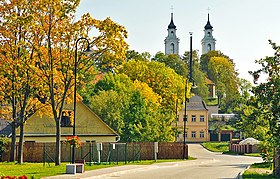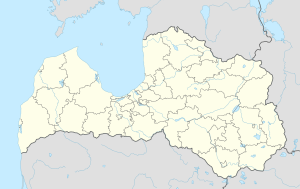Ludza
Ludza | |
|---|---|
Town | |
 Ludza skyline | |
| Coordinates: 56°33′N 27°43′E / 56.550°N 27.717°E | |
| Country | |
| Municipality | Ludza Municipality |
| Town rights | 1177 |
| Government | |
| • Mayor | Edgars Mekšs |
| Area | |
| • Total | 10.47 km2 (4.04 sq mi) |
| • Land | 9.18 km2 (3.54 sq mi) |
| • Water | 1.29 km2 (0.50 sq mi) |
| Population (2024)[2] | |
| • Total | 7,524 |
| • Density | 720/km2 (1,900/sq mi) |
| Time zone | UTC+2 (EET) |
| • Summer (DST) | UTC+3 (EEST) |
| Postal code | LV-570(1-2) |
| Calling code | +371 657 |
| Number of Municipality council members | 15 |
| Website | ludza.lv |
Ludza (; Polish: Lucyn, German: Ludsen, Russian: Лудза, Ludza) is a town in the Latgale region of eastern Latvia.[3] Ludza is the oldest town in Latvia and this is commemorated by a key in its coat of arms.[4] Ludza is the administrative centre of Ludza Municipality that is located nearby the Russian border.[3] The population as of 2020 was 7,667.[5]
History
[edit]
After Nikolay Karamzin, Ludza was first mentioned as Лючин in Hypatian Codex dating back to 1173 or 1177.[6] In 1399 the Livonian Order built a stone fortress atop an older Latgalian fortress and used Ludza as an eastern outpost in Livonia. Ludza Castle ruins can be visited nowadays.[7]
Polish-Lithuanian Commonwealth
[edit]After the dissolution of the Livonian Order in 1561, Ludza was incorporated into the Polish–Lithuanian Commonwealth and became a part of Wenden Voivodeship. In January 1626, during the Polish-Swedish War, Ludza was captured without a battle by Sweden due to the defeat of the forces of Polish-Lithuanian marshal Jan Stanisław Sapieha. Later it was recaptured by Polish forces.[8]
In 1678, Commonwealth's Sejm appointed a special commission in Grodno that had to build Catholic churches in Latgale. A year later, the commission visited Ludza and in 1687, building of the church was completed. In 1736, the church was destroyed by fire.[9]
Russian Empire
[edit]After the first partition of Poland in 1772, Ludza was taken over by the Russian Empire and added to Vitebsk Governorate. Ludza received town rights in 1777 from Catherine II of Russia. During the first part of the 19th century, most of the population of Ludza were Jews (67% in 1815) and there were 7 synagogues in the town.[10]
Latvia
[edit]After signing of the Latvian–Soviet Peace Treaty in 1920, Ludzas apriņķis and Ludza as its administrative centre was incorporated into the Republic of Latvia.
During World War II, Ludza was under German occupation from 4 July 1941 until 23 July 1944.[11] It was administered as a part of the Generalbezirk Lettland of Reichskommissariat Ostland. The Jewish population was restricted to a ghetto. From July 1941 until the spring of 1942, hundreds of Jews were murdered in mass executions perpetrated by Einsatzgruppen.
After Latvia regained its independence in 1991, Ludza became the administrative centre of Ludza District. On July 1, 2009, due to the introduction of the new administrative division in Latvia it became the centre of Ludza Municipality.
Tourism
[edit]
Ludza Museum and Ludza Tourism Information Centre offer excursions around the town. The most visited sights are:
- Ludza History Museum and open-air exposition
- Roman Catholic Church
- Orthodox Church
- Evangelical Lutheran Church
- Old Believers' Church
- Ruins of the medieval Ludza Castle
- Ludza Craftsmen Centre
Several lakes offer fishing and water tourism possibilities.
Transport
[edit]Roads
[edit]Ludza is located on the main Riga - Moscow road, as a part of European route E22, and only 30 km away from the Latvian-Russian border.
Railway
[edit]Ludza Train Station is a part of the Rēzekne II - Zilupe railway line that was originally built in 1901 as a part of Ventspils - Moscow line. The current station building was built after the World War II.[12]
Education
[edit]
The children of Ludza may attend three pre-school educational institutions - "Rūķītis", "Pasaciņa" and "Namiņš". Elementary and secondary education curricula are provided by Ludza Gymnasium and Ludza Secondary School #2, as well as by Ludza Evening Secondary School. Additional out of school activities are offered at:
- Ludza Music Primary School (music school with integrated primary school)[13]
- Ludza Art School[14]
- Ludza Children and Youth Centre[15]
- Ludza Sport School[16]
Demographics
[edit]As of 2020, the town had a population of 7,667, of which 4,455 (58.1%) were ethnic Latvians, 2,661 (34.7%) were ethnic Russians, 168 (2.1%) were Belarusians, 93 (1.2%) were Ukrainians, 63 (0.8%) were Poles, 24 (0.3%) were Lithuanians, and 187 (2.4%) belonging to other ethnic groups.[5]
Notable people
[edit]Born in Ludza
[edit]- Yakov Kulnev (1763–1812) – major-general, hero of the Patriotic war with Napoleon
- Ferdynand Antoni Ossendowski (1878—1945) – Polish writer and explorer
- Karol Bohdanowicz (1864–1947) – Polish geologist
- Leonid Dobychin (1894–1936) – Russian writer
- Ilya Chashnik (1902–1929) – Russian suprematist painter
- Stanislaus Ladusãns (1912-1993) - Jesuit priest
Twinning and international cooperation
[edit]Ludza municipality has several cooperation partners abroad.
- Bad Bodenteich (Germany)
- Hlybokaye (Belarus)
- Brest (Belarus)
- Nevel (Russia)
- Sebezh (Russia)
- Novopolotsk (Belarus)
See also
[edit]References
[edit]- ^ "Reģionu, novadu, pilsētu un pagastu kopējā un sauszemes platība gada sākumā". Central Statistical Bureau of Latvia. Retrieved 31 July 2024.
- ^ "Iedzīvotāju skaits pēc tautības reģionos, pilsētās, novados, pagastos, apkaimēs un blīvi apdzīvotās teritorijās gada sākumā (pēc administratīvi teritoriālās reformas 2021. gadā)". Central Statistical Bureau of Latvia. Retrieved 19 June 2024.
- ^ a b "Ludza municipality". Ludzasnovads.lv. Retrieved 17 June 2022.
- ^ "Ludza municipality - Symbols". Ludzasnovads.lv. Retrieved 17 June 2022.
- ^ a b "ISG020. Population number and its change by statistical region, city, town, 21 development centres and county". data.csb.gov.lv. Retrieved 2021-02-21.
- ^ "Карамзин Н. История государства Российского: примечание 12 к III тому". rvb.ru. Retrieved 2021-02-21.
- ^ "Ruins of Ludza medieval castle". Latvia.travel. Retrieved 17 June 2022.
- ^ Minčonoks, Vladislavs (1961-02-09). "Ludzas pilsētas vēsture" (17 ed.). Ludzas Taisneiba. p. 4.
- ^ Murāns, Francis (1939-08-14). "Ludzas vēstures pēdās" (45 ed.). Daugavas Vēstnesis. p. 5.
- ^ Mejers Melers. Ebreju kapsētas Latvijā. Rīga 2006. ISBN 9984-19-904-5 69. lpp.
- ^ Освобождение городов
- ^ Toms Altbergs, Karīna Augustāne, Ieva Pētersone. Dzelzceļi Latvijā. Rīga : Jumava, 2009, 106. lpp. ISBN 978-9984-38-698-0
- ^ "Ludzas Mūzikas pamatskola". Ludzamuzika.lv. Retrieved 17 June 2022.
- ^ "Ludzas art school - Vasals Latgolā". VisitLatgale.com. Retrieved 17 June 2022.
- ^ "Ludza Youth Club "Umbrella"". Ludzasnovads.lv. Retrieved 17 June 2022.
- ^ "Ludzas novada Sporta skola". Ludzasnovads.lv (in Latvian). Retrieved 17 June 2022.


